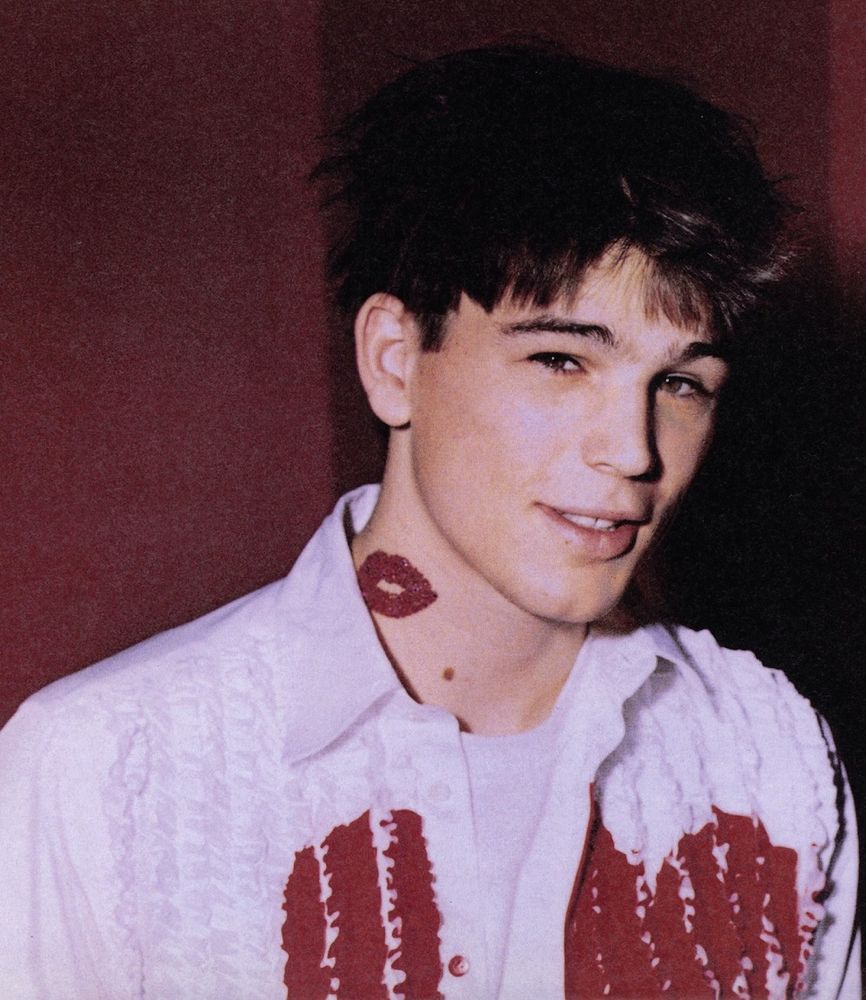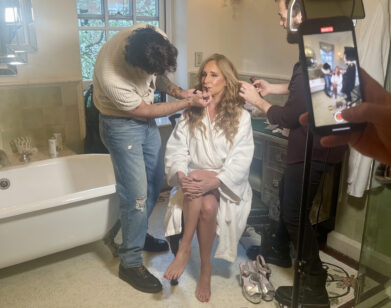New Again: Josh Hartnett

This spring, Josh Hartnett will star alongside Timothy Dalton and Eva Greene in Showtime’s new horror series, Penny Dreadful. Set in Victorian London, creator John Logan has promised the show will be “highly erotic” and “very bloody.” The first pictures leaked earlier this week, and our interest was piqued.
Most of all, however, we’re excited to Josh Hartnett in a high-quality show. Hartnett’s early career was promising: he had parts in Sofia Coppola’s entrancing debut The Virgin Suicides and Robert Rodriguez’s self-consciously campy horror romp The Faculty. Then… things meandered. By 2011, Hartnett seemed destined for made-for-television purgatory.
We spoke with the Minnesota-raised actor several times at the beginning of his career and have reprinted one of our conversations below from our 2000 “Valentine issue.” At 21, Hartnett seemed very, very young.
Josh Harnett
By Elizabeth Weitzman
“Knocking all the girls and their mothers right off their feet” is how Josh Hartnett describes the powerhouse effect of Trip Fontaine, his character in The Virgin Suicides, Sofia Coppola’s nuanced first feature as a director, which opens in April. Heads turn and hearts break when 17-year-old Trip rolls languidly down the high-school corridors in this adaptation of Jeffrey Eugenides’s darkly comic novel about the fate that befalls celestial schoolgirl Lux Lisbon and her equally mythical sisters. When Hartnett arrived in Hollywood from Minnesota, after being kicked out of acting school, he incited a pretty similar reaction. Within two months, he’d found himself a regular TV gig (on Cracker), immediately followed by a brief stop in Teen Horrorland, via Halloween: H20 and The Faculty. From there, he moved smoothly into an unbroken chain of upcoming releases (along with The Virgin Suicides, he’s wrapped Blow Dry, Here on Earth, Town and Country, and next month’s O).
We can’t claim immunity to the charms that got Harnett this far this fast. When he pulls on Trip’s velvet bell-bottoms (the movie is set in the ’70s), they fit so well it’s hard to remember the bemused, introspective 21-year-old actor inside them. But by the same token, when Hartnett strides down that corridor as Trip, he’s moving from up-and-comer status to here-right-now.
ELIZABETH WEITZMAN: Was it hard to get into the head of a character like Trip?
JOSH HARTNETT: No, it was pretty easy. He’s like this former fat boy coming into his own. He just eases right into the lifestyle of utter joy, doing whatever he can to stimulate himself in all the right ways.
WEITZMAN: Is there anything actually in his head?
HARTNETT: I think what he wants from the world is to move to Acapulco and live on the beach with an older woman. In the meantime, he’s just trying to seduce and hang out. But then he falls in love with Lux and everything gets twisted and he has to think again.
WEITZMAN: He does hurt her terribly. Do you think he’s culpable at all in her suicide?
HARTNETT: He definitely has something to do with it but, from a more mature standpoint I would say that if someone is going to commit suicide, she’s going to commit suicide. I would never hold a single other person responsible for that.
WEITZMAN: I was impressed with the light touch the film uses on the topic.
HARTNETT: If you really break it down, suicide is not something you can explain. This is not a story that’s meant to enlighten everyone on the intricacies of taking your own life.
WEITZMAN: Do you think it’s a cautionary tale in any way?
HARTNETT: You could probably sit and figure out who’s to blame, but I’m not sure. I see movies all the time that manipulate you by playing a high note on the piano or some string instrument, and suddenly you’re crying. I’m sick of being told what to think.
WEITZMAN: Is there anything about Trip that’s similar to who you were in high school?
HARTNETT: He’s kind of an alter ego I always wanted, so that sometimes I could say, All right, screw it. I’m just going to be.
WEITZMAN: Were you ever able to do that?
HARTNETT: Whenever I took time off from all my worrying, yes. Like right now, I’m just kind of Trippin’ it.
WEITZMAN: How is he different from who you were most of the time?
HARTNETT: I don’t think he has that third eye pointed at himself. I think it’s pointed at the clouds, thinking of some Led Zeppelin song.
WEITZMAN: Are you particularly drawn to dark characters—or characters who, if not dark themselves, participate in other people’s darkness? I’m thinking of Trip’s willful irresponsibility.
HARTNETT: I like to think there’s a little darkness and a little lightness in [all the characters I play]. Trip is kind of an innocent until the end. It’s more interesting when people overcome inner turbulence, but at the same time I do like the innocent. Have you ever read The Idiot? I think Dostoyevsky created a brilliant character there. He doesn’t have any self-inflicted wounds. I love that. People don’t like him because he’s so pure.
WEITZMAN: One of Lux’s sisters, who suffers from many self-inflicted wounds, says that there’s no pain worse than adolescence. Do you agree, or do you think life can get worse?
HARTNETT: I don’t think it gets worse. It’s a pretty scary time. So many emotions come up and you don’t really have the wisdom to make the right choices. You can really screw yourself in adolescence.
WEITZMAN: There have been so many real-life situations lately where kids have acted out horribly on their pain and rage. Why do you think this is?
HARTNETT: Well, I think the fact that we allow guns in our country is the main problem with school shootings. [So many people] have guns and their way of dealing with stress or with a person they don’t like is just to blow them away. The next thing you know, we’ll be giving people rocket launchers. The right to bear arms—that is fuckin’ bullshit. I would rather somebody walk up with a knife and really have to feel what they’re doing than for them to be able to take this mindless action that feels like nothing, like a video game.
WEITZMAN: Do you blame incessant images of violence are to blame?
HARTNETT: I don’t know, but it’s kind of disturbing that sex can’t be shown on TV but they’ll show a million killings. I don’t know why we’re so much more afraid of our bodies.
WEITZMAN: And what about you? How do you feel about doing nude scenes?
HARTNETT: I’m not comfortable with it yet, but we’ll see. Some people have this meat-market mentality, so you’ve got to take your shirt off because it will bring girls into the theater. When that comes up on set, I challenge it.
WEITZMAN: Do they ask you to do that often?
HARTNETT: No. I don’t have a very good body. Some of these guys work out every day. I work out maybe once a year, so they’ve got me beat.
WEITZMAN: Do you think youth culture is lopsided in favor of MTV-style instant gratification, or are teens getting a pretty representative cross section of influences right now?
HARTNETT: The people who are getting a good cross section are reading books. For every good teen movie—and they will never call The Virgin Suicides a teen movie—there are 10 bad ones. There’s so much crap coming out of every orifice of the industry that it’s hard to find anything good. It’s not anybody’s fault; it’s just the general ideals in Hollywood.
WEITZMAN: Hollywood is probably as tough a place to be as high school in a way.
HARTNETT: It is high school.
WEITZMAN: [laughs] Did you know what it was going to be like when you went out there?
HARTNETT: My opinions definitely changed when I got there. I thought it was going to be this magical place where people walked around in slouch hats and overalls and carried monstrous signs. When I saw Chaplin, I thought that was the way Hollywood is—except a little more built-up. I thought all of the studio heads would just kind of wink across the tops of buildings at each other and say, “Aha!” So I was kind of disappointed. I moved away pretty quickly.
WEITZMAN: When you first got there, did you expect to wait on tables for three years or did you think you’d start working right away?
HARTNETT: [laughs] I was like, Oh, I’ve seen enough movies—it’s not going to be so hard. I had no idea. Luckily it happened that way or I would have come home and done something else.
WEITZMAN: How long would you have waited?
HARTNETT: I gave myself two months.
WEITZMAN: What would you have done if it hadn’t worked out like that. Did you have a backup plan?
HARTNETT: I never had any backup.
WEITZMAN: What do you think you might be if you weren’t an actor?
HARTNETT: A professional football player.
WEITZMAN: You would have to start working out.
HARTNETT: Oh, no. I just want it to happen. I don’t want to work for it.
WEITZMAN: If you ended your acting career, would you miss anything?
HARTNETT: I would just be mush. I wouldn’t do anything if I didn’t have something I was working for.
WEITZMAN: But you’re not working on anything right at this minute.
HARTNETT: I’m searching for the right girl right now. That’s my goal.
WEITZMAN: To a degree, The Virgin Suicides is about the cosmic mystery that separates boys and girls. Trip really doesn’t understand girls at all.
HARTNETT: No, but he does know how to seduce them. They’re two completely different things.
WEITZMAN: Did you understand girls when you were his age?
HARTNETT: I don’t think I really understand girls now.
WEITZMAN: But do you know how to seduce them?
HARTNETT: I doubt it. I figured out the only way to get women in high school was not to care that much. Now I realize that you have to live your life and eventually they’ll be attracted to you and you’ll be attracted to them and it will just happen. I think. I think.
WEITZMAN: Does love generally mean different things to boys and girls?
HARTNETT: Yes. I think guys understand love a little better than girls.
WEITZMAN: Really? How so?
HARTNETT: Guys think of love as a feeling, which means that if you do something wrong you can still love somebody. So guys are constantly screwing up and then saying, “But I love you!” And girls have a different standard for love.
WEITZMAN: Did you screw up a lot when you were a teenager?
HARTNETT: Oh yeah. I screwed up and I’m still screwing up. I can’t give it up. It’s like it’s my pastime.
WEITZMAN: Are you single right now?
HARTNETT: Yes, kind of.
WEITZMAN: Have you ever had your heart broken as bad as Lux does?
HARTNETT: I have had my heart broken, and it’s no fun. But I’d rather have my heart broken than break someone else’s.
WEITZMAN: Who’s going to be your Valentine this year?
HARTNETT: Some girl.
WEITZMAN: Do you have a specific girl in mind?
HARTNETT: Yeah, but things change. We’ll see. I don’t know.
WEITZMAN: Is it important to you to have a Valentine?
HARTNETT: As far as Valentine’s Day or in general?
WEITZMAN: For Valentine’s Day.
HARTNETT: No, not at all. In grade school we passed out little hearts that said “I love you,” and we all got to eat candy. That’s when Valentine’s Day mattered to me. Now every day is Valentine’s Day.
THIS ARTICLE INTIALLY APPEARED IN THE FEBRUARY 2000 ISSUE OF INTERVIEW.
New Again runs every Wednesday. For more, click here.






